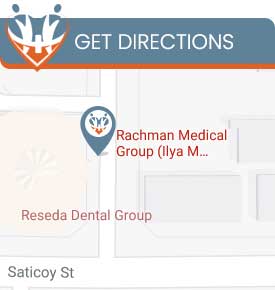Diabetes Management: Tips for Lowering Blood Sugar
If you have been diagnosed with diabetes, and you are unsure how to manage it or go about working with diabetes, contact Rachman Medical Clinic. Our experienced and professional doctors are knowledgeable and can help with your diabetes diagnosis with management, prescriptions and so much more! To learn more contact us today or schedule an appointment online. We Are Conveniently Located at 7601 Canby Ave Suite 7 Reseda, CA 91335.


Table of Contents:
How can I manage my diabetes?
How do you lower a diabetic’s blood sugar?
What are diabetes ABCs and How manage these?
What are the recommended targets for blood glucose levels?
How does our doctor help with diabetes management?
Managing diabetes can be quite overwhelming, it is best to consult a medical physician to help manage your diabetes and offer other recommendations. Managing your diabetes can be difficult due to the many foods, drinks, and other lifestyle activities that can change the levels of your blood sugar, even unexpectedly. Some factors that can change your blood sugar levels include:
• Food
Eating healthy is one of the main factors of healthy living, even without diabetes. Knowing how foods can affect your blood sugar levels is important, as it can make your blood sugar levels rise or even fall and cause many complications. To ensure you are following proper management of your diabetes with food, make sure to do the following:
• Learn about carb counting and the correct portion sizes you should be consuming
• Every meal should be balanced
• Coordinate your meals with medications
• Avoid consuming sugar-sweetened beverages
• Exercise
Exercise is very important in managing your diabetes. While staying active, your muscles will begin to burn sugar for energy, this will help your body use insulin more efficiently if done regularly. Some factors can trigger drops and rises in blood sugar levels; it is best to do the following when creating an exercise schedule:
• Speak to your primary care physician about your exercise plan
• Create an exercise schedule
• Understand your numbers
• Consistently check your blood sugar levels
• Stay hydrated
• Be prepared for anything
• Adjust your treatment plan if needed
• Medication
Diabetes often includes medication like insulin and other medications to lower your blood sugar levels when your diet and exercise are not sufficient enough to manage your diabetes. However, other medications you may take can also affect your blood sugar levels, to ensure you do not run into any complications with your medication, do the following:
• Store your insulin correctly
• Report any issues you may be having to your physician
• Be careful and speak to your physician about any new medications you are going to take to ensure no complications occur
• Illness
Getting sick can cause its issues; being diabetic and becoming ill brings on another level of complications. Ensure to do the following so you are prepared:
• Plan in case you do become sick by creating instructions on a list of medications to take when to measure your blood sugar levels and any adjustments that need to be made in the case.
• Continue taking your diabetic medication even if you become ill
• Stick to your diabetic meal plan
• Alcohol
When drinking alcohol, it can cause your blood sugar levels to lower and can keep them lowered for 24 hours or longer, to ensure you are ok, do the following:
• Ensure your doctor gives you the all-clear to drink alcohol
• Do not drink beverages with alcohol in them if you have an empty stomach
• Choose what you drink carefully
• Tally up the calories from your beverages
• Check your blood sugar levels before going to bed
• Menstruation and Menopause
Menstruation and menopause can cause your hormone levels to change quite drastically, ensure:
• You look for patterns that lead up to your menstruation dates
• Adjust your diabetes treatment if/when needed
• Check your blood sugar levels more regularly to ensure you are on track
• Stress
Stress is a major contributor to your blood sugar levels rising. It can be quite difficult to manage your diabetes like usual when stressed, so ensure:
• You look for any patterns during stressful periods
• Take control by fighting back when stress hits
• Get the help you need to cope with your stress
There are many different things you can do to help lower your blood sugar if you are diabetic, including:
• Regular exercise
• Managing your carb intake
• Consuming fiber
• Stay hydrated with water
• Portion control
• Choosing foods with a lower glycemic index
• Manage your stress
• Regularly monitor your blood sugar levels
• Get good quality sleep
• Consume foods rich in chromium and magnesium
• Consider adding specific foods to your diet
• Maintaining your weight
• Eat healthily
• Eat foods rich in probiotics
ABC’s of diabetes management is A1c which tests and measures the blood glucose control over a 2–3-month span. B is for blood pressure, monitoring it consistently, and C is checking your cholesterol.
Each individual dealing with diabetes should speak to their doctor on how to manage their ABCs, as each individual will need different instructions.
You want to manage these to ensure you know your numbers and you do not cause significant complications with your diabetes.
The recommended blood sugar levels for a typical diabetic are the following:
• Before a meal: 80 to 130 mg/dL
• Two hours after the start of any meal: Must be less than 180 mg/dL
The primary doctor will monitor diabetes in their patients at each regular check-up. The doctor will perform a blood test to help check for any disease, depending on the symptoms as well as your risk factors. If you are diagnosed with diabetes, the doctor may prescribe medication and continue managing your condition. We serve patients in Reseda CA, San Fernando CA, Twin Lakes CA, Hidden Hills CA, and Burbank CA.

Additional Services You May Like
▸ Primary Care
▸ Medicare
▸ Diabetes
▸ Hypertension
▸ Medicare Advantage Primary Care
▸ Internal Medicine
▸ Management of Chronic Conditions
▸ Primary Care for Medicare Patients
▸ Type 1 Diabetes
▸ Type 2 Diabetes

Additional Services You May Like
▸ Primary Care
▸ Medicare
▸ Diabetes
▸ Hypertension
▸ Medicare Advantage Primary Care
▸ Internal Medicine
▸ Management of Chronic Conditions
▸ Primary Care for Medicare Patients
▸ Type 1 Diabetes
▸ Type 2 Diabetes





